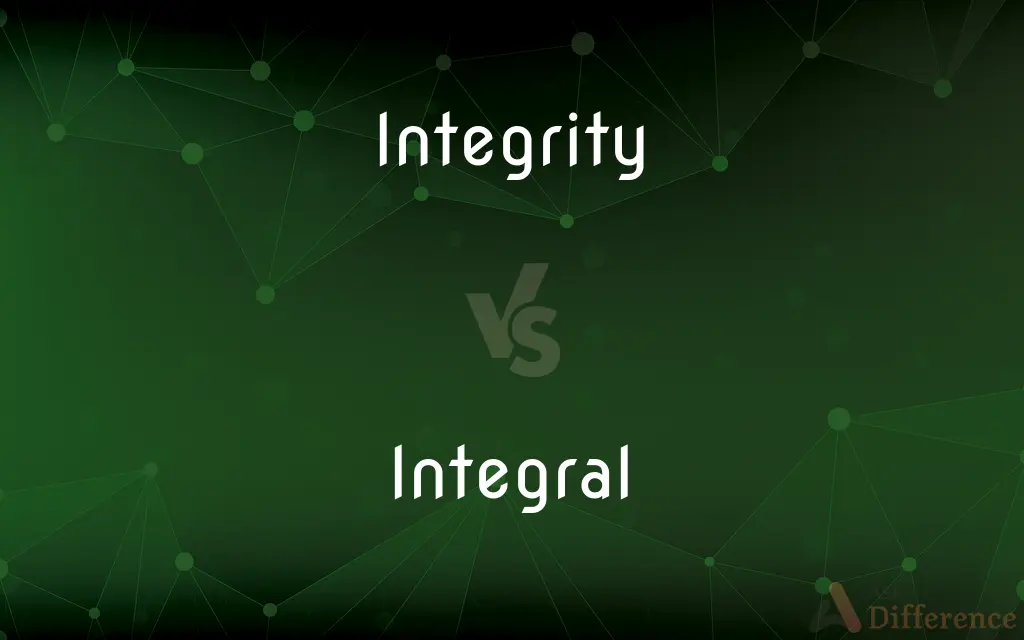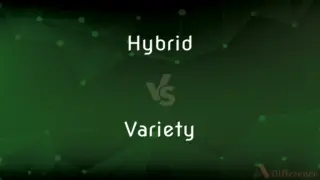Integrity vs. Integral — What's the Difference?
Edited by Tayyaba Rehman — By Urooj Arif — Updated on March 28, 2024
Integrity refers to the quality of being honest and having strong moral principles, while integral means essential or necessary to make something complete.

Difference Between Integrity and Integral
Table of Contents
ADVERTISEMENT
Key Differences
Integrity is a moral and ethical term, describing the character of an individual or the wholeness of an object. It implies honesty, consistency of actions, values, methods, measures, principles, expectations, and outcomes. When talking about a person, it suggests a steadfast adherence to a strict moral or ethical code.
Integral, however, denotes something that is necessary to form a whole or to make something complete. It can be applied to components of a physical object, concepts in mathematical contexts (such as integral calculus), or elements within a system or process.
While integrity encompasses the idea of wholeness, its application is largely in the realm of ethics and morality, focusing on the character and actions of an individual or the indivisibility of an object. Integral, conversely, focuses on the necessity of certain components to achieve completeness or functionality in a system, object, or concept.
In a workplace setting, integrity might refer to the ethical practices of the employees and the organization as a whole, emphasizing honesty and fairness in dealings. Meanwhile, describing a component as integral in a workplace project underscores its essential role in the project’s success.
The distinction is also notable in their application: integrity is often used to describe the abstract qualities of beings or objects, imbuing them with a sense of completeness and moral uprightness. Integral, however, is used to highlight the indispensability of certain elements or parts in making a system complete, effective, or fully functional.
ADVERTISEMENT
Despite these differences, both terms hint at a state of completeness, either through moral wholesomeness or through the necessity of components for completeness. The key distinction lies in integrity's focus on moral and ethical completeness, and integral's emphasis on the necessity for functional completeness.
Comparison Chart
Definition
The quality of being honest and having strong moral principles.
Necessary to make something complete.
Application
Ethics, morality, and the wholeness of an object.
Components essential for completeness or functionality.
Focus
Moral and ethical character, wholesomeness.
Necessity for system completeness.
Usage
Describes character or state of objects.
Describes essential parts or elements.
Examples
A person's adherence to moral principles. The integrity of a structure.
Trust is integral to a relationship. Oxygen is integral for combustion.
Compare with Definitions
Integrity
The state of being whole, entire, or undiminished.
The earthquake tested the integrity of the building.
Integral
Necessary to the completeness of the whole.
Regular exercise is integral to maintaining good health.
Integrity
A sound, unimpaired, or perfect condition.
The integrity of the glass was compromised by a crack.
Integral
Constituting a whole together with other parts or factors.
Water is integral to the recipe for bread.
Integrity
Often associated with individuals but can apply to structures or systems.
The company’s integrity is respected industry-wide.
Integral
In mathematics, related to or using integrals.
Solving the problem requires understanding integral calculus.
Integrity
Adherence to moral and ethical principles; soundness of moral character; honesty.
The judge is known for her integrity.
Integral
Applied to describe parts whose presence is essential.
The CPU is an integral component of any computer.
Integrity
Reflects a qualitative assessment of character or structure.
His actions demonstrated true integrity.
Integral
Can be used in various contexts to emphasize necessity for functionality.
Collaboration is integral in team projects.
Integrity
Integrity is the practice of being honest and showing a consistent and uncompromising adherence to strong moral and ethical principles and values. In ethics, integrity is regarded as the honesty and truthfulness or accuracy of one's actions.
Integral
In mathematics, an integral assigns numbers to functions in a way that describes displacement, area, volume, and other concepts that arise by combining infinitesimal data. The process of finding integrals is called integration.
Integrity
Steadfast adherence to a strict moral or ethical code
A leader of great integrity.
Integral
Necessary to make a whole complete; essential or fundamental
Games are an integral part of the school's curriculum
Systematic training should be integral to library management
Integrity
The state of being unimpaired; soundness
The building's integrity remained intact following the mild earthquake.
Integral
Of or denoted by an integer.
Integrity
The quality or condition of being whole or undivided; completeness
Replaced a lost book to restore the integrity of his collection.
Integral
A function of which a given function is the derivative, i.e. which yields that function when differentiated, and which may express the area under the curve of a graph of the function.
Integrity
Steadfast adherence to a strict moral or ethical code.
Integral
Essential or necessary for completeness; constituent
The kitchen is an integral part of a house.
Integrity
The state of being wholesome; unimpaired
Integral
Possessing everything essential; entire.
Integrity
The quality or condition of being complete; pure
Integral
Expressed or expressible as or in terms of integers.
Integrity
(cryptography) With regards to data encryption, ensuring that information is not altered by unauthorized persons in a way that is not detectable by authorized users.
Integral
Expressed as or involving integrals.
Integrity
(aviation) The ability of systems to provide timely warnings to users when they should not be used for navigation.
Integral
A complete unit; a whole.
Integrity
Trustworthiness; keeping your word.
Integral
A number computed by a limiting process in which the domain of a function, often an interval or planar region, is divided into arbitrarily small units, the value of the function at a point in each unit is multiplied by the linear or areal measurement of that unit, and all such products are summed.
Integrity
The state or quality of being entire or complete; wholeness; entireness; unbroken state; as, the integrity of an empire or territory.
Integral
A definite integral.
Integrity
Moral soundness; honesty; freedom from corrupting influence or motive; - used especially with reference to the fulfillment of contracts, the discharge of agencies, trusts, and the like; uprightness; rectitude.
The moral grandeur of independent integrity is the sublimest thing in nature.
Their sober zeal, integrity, and worth.
Integral
An indefinite integral.
Integrity
Unimpaired, unadulterated, or genuine state; entire correspondence with an original condition; purity.
Language continued long in its purity and integrity.
Integral
Constituting a whole together with other parts or factors; not omittable or removable
Integrity
An unreduced or unbroken completeness or totality
Integral
(mathematics) Of, pertaining to, or being an integer.
Integrity
Moral soundness
Integral
(mathematics) Relating to integration.
Integral
(obsolete) Whole; undamaged.
Integral
(mathematics) One of the two fundamental operations of calculus (the other being differentiation), whereby a function's displacement, area, volume, or other qualities arising from the study of infinitesimal change are quantified, usually defined as a limiting process on a sequence of partial sums. Denoted using a long s: ∫, or a variant thereof.
The integral of a univariate real-valued function is the area under its curve; but be warned! Not all functions are integrable!
Integral
(specifically) Any of several analytic formalizations of this operation: the Riemann integral, the Lebesgue integral, etc.
Integral
(mathematics) A definite integral: the result of the application of such an operation onto a function and a suitable subset of the function's domain: either a number or positive or negative infinity. In the former case, the integral is said to be finite or to converge; in the latter, the integral is said to diverge. In notation, the domain of integration is indicated either below the sign, or, if it is an interval, with its endpoints as sub- and super-scripts, and the function being integrated forming part of the integrand (or, generally, differential form) appearing in front of the integral sign.
The integral of on is , but the integral of the same function on diverges. In notation, , but .
Integral
(mathematics) An indefinite integral: the result of the application of such an operation onto a function together with an indefinite domain, yielding a function; a function's antiderivative;
The integral of is plus a constant.
Integral
The fluent of a given fluxion in Newtonian calculus.
Integral
Lacking nothing of completeness; complete; perfect; uninjured; whole; entire.
A local motion keepeth bodies integral.
Integral
Essential to completeness; constituent, as a part; pertaining to, or serving to form, an integer; integrant.
Ceasing to do evil, and doing good, are the two great integral parts that complete this duty.
Integral
Of, pertaining to, or being, a whole number or undivided quantity; not fractional.
Integral
A whole; an entire thing; a whole number; an individual.
Integral
An expression which, being differentiated, will produce a given differential. See differential Differential, and Integration. Cf. Fluent.
Integral
The result of a mathematical integration; F(x) is the integral of f(x) if dF/dx = f(x)
Integral
Existing as an essential constituent or characteristic;
The Ptolemaic system with its built-in concept of periodicity
A constitutional inability to tell the truth
Integral
Constituting the undiminished entirety; lacking nothing essential especially not damaged;
A local motion keepeth bodies integral
Was able to keep the collection entire during his lifetime
Fought to keep the union intact
Common Curiosities
Can something be integral but not ethical?
Yes, something can be essential (integral) to a process or system without having ethical implications.
Why is it important for parts to be integral to a system?
Integral parts ensure the system’s functionality, effectiveness, and completeness, contributing to its overall success.
Can a person be described as integral?
Yes, a person can be described as integral if their role or presence is essential to a group, project, or organization.
Can the integrity of an object be measured?
In a physical or structural sense, yes. The integrity of an object can be assessed through its strength, durability, and condition.
Can a system or process have integrity?
Yes, systems or processes can have integrity if they operate consistently, reliably, and ethically, fulfilling their intended purpose without compromise.
How can an organization demonstrate integrity?
An organization demonstrates integrity through ethical business practices, transparency, accountability, and respect for all stakeholders.
Does integrity have a quantitative aspect?
While integrity is primarily qualitative, focusing on moral qualities, it can indirectly influence quantitative outcomes, such as business success or failure.
How does the concept of integral relate to teamwork?
In teamwork, each member’s contribution is considered integral, as it is necessary for the team’s collective success and achievement of objectives.
Can integrity be restored once lost?
Yes, integrity can be restored through actions that demonstrate accountability, remorse for past actions, and a consistent effort to act ethically moving forward.
How does being integral to a team affect an individual's responsibilities?
Being integral to a team increases an individual's responsibilities, as their contributions are essential to the team's success, requiring reliability and consistency.
How does integrity affect professional life?
Integrity in professional life builds trust with colleagues and clients, fosters a positive work environment, and enhances a company's reputation.
Is integrity subjective or objective?
Integrity is somewhat subjective, as it's based on individual or societal moral standards, but it aims for an objective consistency in ethical behavior.
Are there tools or methods to measure how integral a component is?
While specific tools may vary by field, methods to measure a component's integrality often involve analyzing its impact on the system’s functionality and outcomes.
Is it possible for something to be too integral?
Yes, when something becomes so integral that its failure or absence paralyzes the system, it can indicate a vulnerability or lack of redundancy in the design.
Can a business operate without integrity?
A business can operate without integrity in the short term, but long-term success and sustainability are often compromised, leading to trust issues with stakeholders.
How can one improve their integrity?
Improving integrity involves self-reflection, commitment to ethical principles, honesty in all actions, and a willingness to make ethical choices even when challenging.
What makes an element integral to a structure or concept?
An element is integral if removing it would alter the fundamental nature or functionality of the structure or concept, indicating its essential role.
How do cultural differences affect perceptions of integrity?
Cultural differences can influence what is considered ethical or moral, thereby affecting perceptions of integrity. Understanding and respecting these differences is crucial in global interactions.
How do personal integrity and professional integrity intersect?
Personal and professional integrity are interconnected; individuals who uphold ethical standards personally are more likely to practice integrity in their professional lives, and vice versa.
Share Your Discovery

Previous Comparison
Hybrid vs. Variety
Next Comparison
Passionfruit vs. GranadillaAuthor Spotlight
Written by
Urooj ArifUrooj is a skilled content writer at Ask Difference, known for her exceptional ability to simplify complex topics into engaging and informative content. With a passion for research and a flair for clear, concise writing, she consistently delivers articles that resonate with our diverse audience.
Edited by
Tayyaba RehmanTayyaba Rehman is a distinguished writer, currently serving as a primary contributor to askdifference.com. As a researcher in semantics and etymology, Tayyaba's passion for the complexity of languages and their distinctions has found a perfect home on the platform. Tayyaba delves into the intricacies of language, distinguishing between commonly confused words and phrases, thereby providing clarity for readers worldwide.
















































